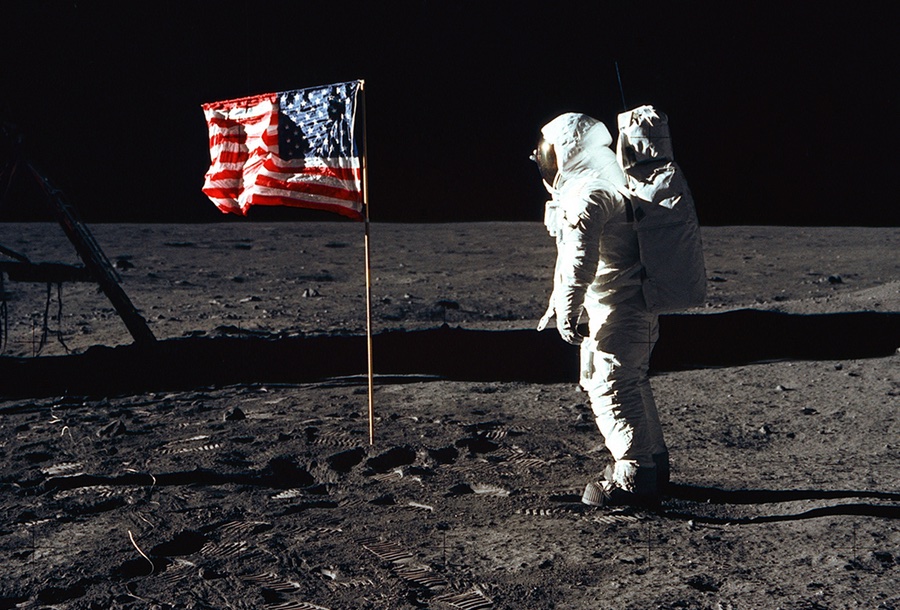Computer engineer Jack Garman reflects on his time at NASA, his work on the computer systems of Apollo 11 and what it was like to help put people on the moon
Subscribe to All About History now for amazing savings!
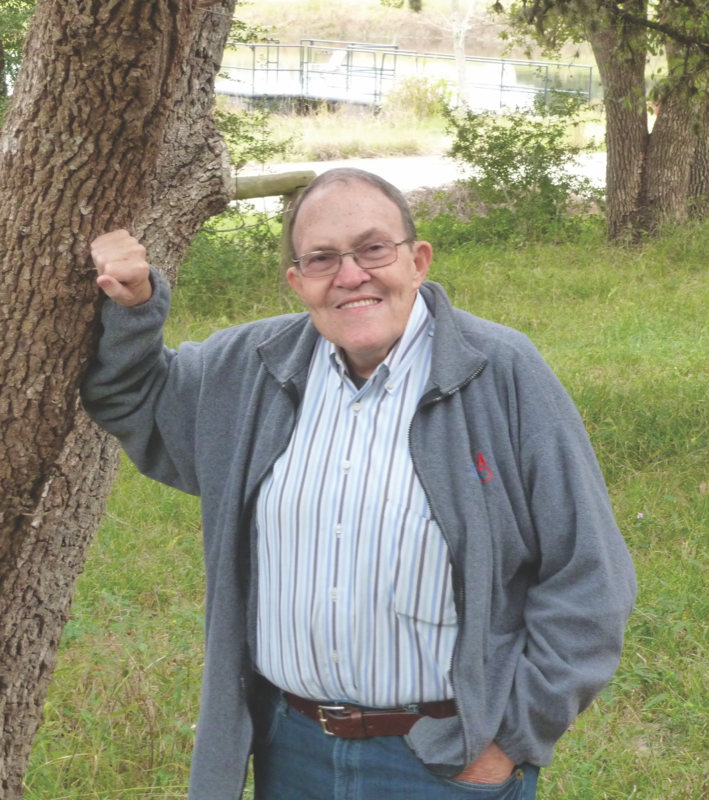
At 8.18pm (GMT) on 20 July 1969, Americans Neil Armstrong and Buzz Aldrin became the first humans to land on the Moon. It is arguably mankind’s greatest accomplishment to date, but over 380,000 kilometres (240,000 miles) away, those people in NASA’s Mission Control Center at the Johnson Space Center in Houston, Texas, were celebrating out of relief as much as joy, having just overcome one of the most difficult and technical missions in human history. Inside Mission Control, computer engineer Jack Garman was at the heart of the celebrations, having just saved the mission from disaster minutes prior to the landing.
At the time of the Apollo 11 landing, Garman was very young in comparison to his colleagues. He’d joined NASA as a fresh-faced 21-year-old in 1966, straight out of college. Within just three years he had acclimatised himself with the workings of the computer that would power and control the Apollo 11 spacecraft, and on the day of the landing was tasked with watching over those computers to ensure the landing went without a hitch. These computers were rudimentary at best in nature, though and not easy to operate.
“It was strange, different, to have a system, a vehicle, that was run by computer. I mean, today even our cars are run by computers, but back then almost all the systems were analogue,” explains Garman as he tells us about his work in Mission Control: “They wanted a so-called expert in the control centre, so they gave me a council in the Apollo Guidance Computer support room and that’s where I spent a lot of time during most of the flights to the Moon.”
On the day of the landing, Mission Control was bustling and buzzing with hundreds of people: “During the landing itself I remember that when they got near the lunar surface, Buzz Aldrin made a call-out saying [softly]: ‘We’ve got dust now,’” Garman tells us. “The descent engine was firing up dust from the lunar surface. With all the simulations we’d been through it was kind of like a script, but he’d never made that call before! He didn’t follow the script! That was an awakening. I mean, you knew it was real, but still, wow! This is it, they’re about to land.”
It turns out though, that as they were preparing to land, unbeknownst to the astronauts, Garman had performed some vital preparations that would ensure the mission could continue and history would be made that night. Garman and his team were responsible for ensuring they could overcome any programme alarm that might be thrown up by the primitive computer, but one alarm still seemingly stumped some of the brightest minds ever assembled.
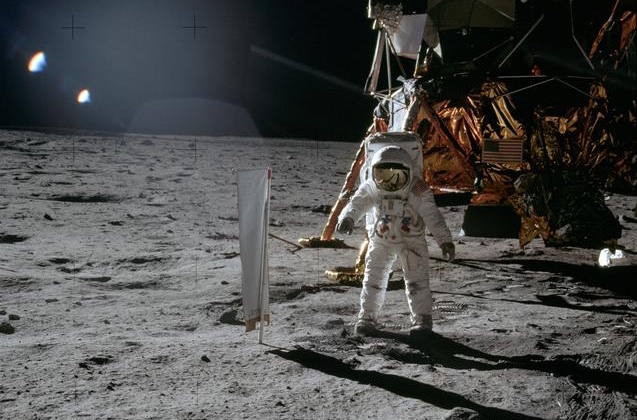
During one simulation prior to the landing a computer alarm came up, known as a ‘1202 alarm’, which Garman and his team hadn’t seen before. His superior at the time, guidance officer Steve Bales, called for an abort. “Afterwards Gene Kranz, who was the flight director for the Apollo 11 landing, boy did he get mad,” explains Garman. “He was all over the simulation guys for putting in a simulation that caused an abort this close to the real flight. And the simulation guys said: ‘Uh uh, wrongo bongo fella, you’re supposed to recover from this.’ After the debriefing, oh boy, did the fur fly.”
Kranz told Garman to make sure he knew every possible programme alarm that could come up. So the young computer engineer studied them all and drew himself a cheat sheet he could refer to during the mission. It just so happened that Garman’s diligence in doing his homework helped save the mission when it was just minutes away from landing.
During the mission, as Armstrong and Aldrin were descending to the lunar surface, an error reading came up that suggested the on-board computer was running over capacity, the same 1202 alarm that had come up during the simulation. As had been witnessed in the simulation, such a reading was a cause to abort the mission, as Aldrin and Armstrong would not be able to operate the Lunar Module if the computer was not working. Thanks to the flight director’s insistence that he brushed up on programming alarms, Garman was the only person in the room who knew this alarm was no reason to abort the mission, and he quickly let his superiors know.
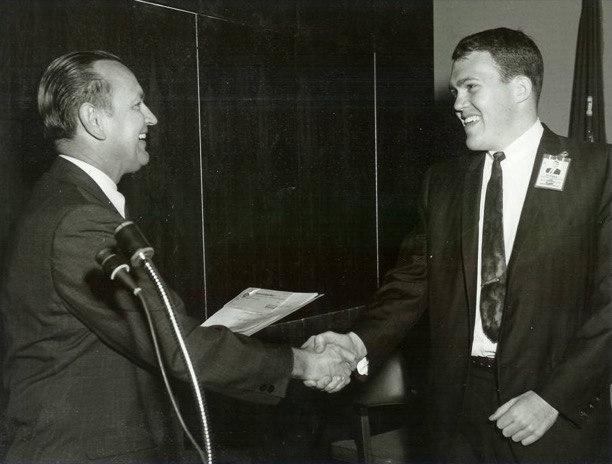
“I looked down at the cheat sheet, saw what [the alarm] was and told them it was okay,” says Garman: “As long as there weren’t other indications like that the computer was guiding the vehicle to turn upside down or something, we were go. And that’s the call they made. Now, to be clear, the speed of light is pretty fast, but it’s still a couple of seconds when you’re going from the Moon to Earth, and that’s the same rate at which voice or radio transmission goes. So when the alarm happened we didn’t hear Buzz Aldrin asking what it was for several seconds. And then take a few seconds to give a response and give it back to them, then for the CAPCOM [Capsule Communicator] to call up and say they were go, then add the reaction time for human beings, it was probably [in total] 19 or 20 seconds for the crew before they got a response from us, very nerve-racking. We know it’s one of the reasons Armstrong lost track of where he was [above the Moon] because he wasn’t looking out of the window. They didn’t know where they had landed for quite a while after they touched down, probably in a large part due to the disturbing nature of these programme alarms.”
Just a few seconds later, though, Apollo 11 did indeed land safely. As Aldrin and Armstrong celebrated, so too did everyone back in Mission Control on Earth. “I remember Kranz had to calm everybody down, get back to your seats, it’s time to go through the landing checklist, and get everything safe and get them ready to get out and all that jazz,” says Garman. “It was a very, very euphoric kind of atmosphere; by jove, we actually did it, they actually landed on the Moon.”
Garman describes the mood in Mission Control at the time of the landing as eerie. “What I mean is it’s like being an actor in a play,” he explains. “You go through a lot of rehearsals and dress rehearsals, and then there’s actually opening night. When that curtain goes up there’s a real audience out there and it’s a different feeling. It’s eerier. And that’s as close as I can get to describing what I mean by eerie. When you have been through the procedures and lots of simulated problems, and you’ve been through vehicle tests where you’re watching the real vehicle on the launchpad and then you actually do it for the first time, and they actually land, you go wow, this is something. That’s what I mean by eerie. Not eerie in a sense of unreal, but eerie in the feeling it gave. It was very real, for sure.”
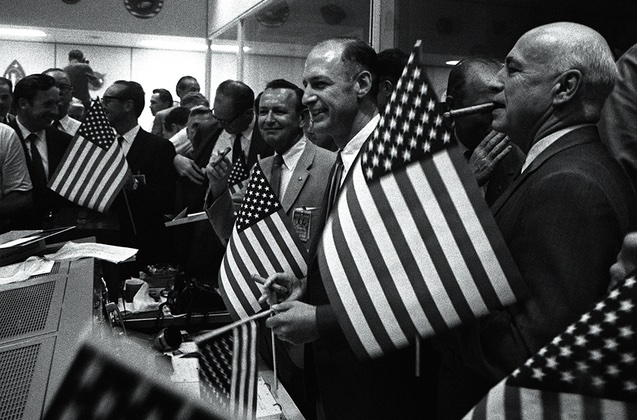
It was an incredibly proud achievement for Garman and his colleagues: “I think that any time you can be in a job where you feel like you’re higher up on the triangle – and I don’t mean that in a superior way – but you’re not in a factory building stuff or supplying food, you’re not even in education providing teaching, but you may actually be helping to further the knowledge of the human race in some way, you can feel good about that. I certainly did. We certainly did. And to be in that kind of a job and to have the excitement and risk and adventure that goes with it, it’s a very self-fulfilling feeling. It was pretty easy to be dedicated and tenacious, spend way too much time at work, that kind of thing. I was very proud to have been part of that, and I was proud to have been part of the on-board computer for the Space Shuttle as well, and for everything else I did for NASA.”
For Garman, Apollo 11 was an experience of a lifetime that will remain one of mankind’s greatest achievements in the history books. “I doubt that sort of accomplishment will be repeated, at least not in my lifetime. I think apart from putting a human being on Mars or something like that, that’s a ways away. Even going back to the Moon or going to an asteroid, even if that happens, it won’t be quite the same as the first time. It never is.”
Originally published in All About History 9
Subscribe to All About History now for amazing savings!

